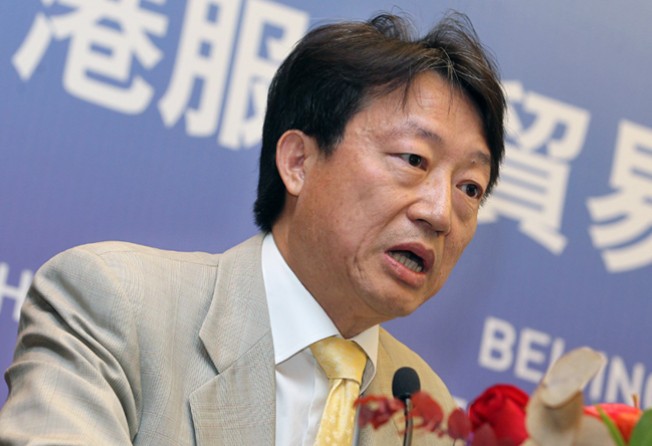Law society condemns Occupy Central plan
Legal group's leader says he is angry about the disruption of social order and the rule of law by groups in city 'abusing the name of justice'

The city's largest lawyers' group yesterday joined the chorus condemning the Occupy Central civil disobedience plan, with its president saying the action was without legal grounds and the notion of "peaceful violence" was just "beautiful rhetoric".
And the State Council's Taiwan Affairs Office warned against "a confluence" of the plan and Taiwanese independence, after a controversial meeting between a key Occupy Central organiser and a former leader of Taiwan's Democratic Progressive Party.
The movement plans to blockade the business district next summer if the government fails to come up with a satisfactory plan for full democracy in the 2017 chief executive election.
Law Society president Ambrose Lam San-keung yesterday said he did not support any civil disobedience action, and insisted the concept of civil disobedience "was not a legal principle".
In a rare gesture, he also said he was "angry" about recent attempts to challenge the social order, although he refused to say whether he was pointing the finger at the Occupy Central movement. He denied his comments were based on "orders from Beijing". "I am angry that many people are disrupting the social order and the rule of law by abusing the name of justice," Lam said. "There are ample channels for individuals to express their discontent against the system - either through the legislature or the courts to change the laws."
Lam also drew a comparison between the situation facing the Occupy Central movement and those of India's Mahatma Gandhi and America's Martin Luther King. He said Hong Kong's situation could not be compared to the conditions faced by the two civil disobedience advocates. "Our systems are running and working," said Lam. "Peaceful violence was just beautiful rhetoric. It is never a legal principle that can stand up in court."
Benny Tai Yiu-ting, an associate law professor at the University of Hong Kong who first put forward the plan, said when there was injustice in the law and the legal system, it was impossible to achieve justice under the existing system. He insisted the plan was peaceful and non-violent and any civil disobedience action would only happen after existing channels had been exhausted.
Criticism of Occupy Central has been mounting since a meeting between Shih Ming-teh, a former chairman of Taiwan's Democratic Progressive Party, and three pan-democrats - including the plan's core organiser, Reverend Chu Yiu-ming - in Taipei on October 19. Joseph Cheng Yu-shek, convenor of the Alliance for True Democracy, and Labour Party chairman Lee Cheuk-yan were also present.
Taiwan Affairs Office spokeswoman Fan Liqing , said Hongkongers would condemn the "confluence of the Occupy Central plan and Taiwanese independence". "Advocates of Taiwanese independence are conspiring to mess up Hong Kong. [But they] won't win public support and they won't succeed."
The overseas edition of Communist Party mouthpiece People's Daily also suggested yesterday that the Occupy Central plan was "an attempt to coerce the central government", and the business district was being "threatened by extremists".
Core Occupy Central organiser Dr Chan Kin-man described the attacks as "mud-slinging".